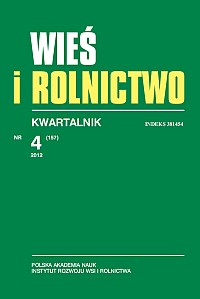Grabież ziem uprawnych (land grabbing) jako nowa forma imperializmu ekonomicznego
Land grabbing as a new form of economic imperialism
Author(s): Adriana ŁukaszewiczSubject(s): Economy
Published by: Instytut Rozwoju Wsi i Rolnictwa Polskiej Akademii Nauk
Keywords: land grabbing; failed states; food security; land speculation; African agriculture; land grabbing; państwa upadłe; bezpieczeństwo żywnościowe; spekulacja ziemią; rolnictwo afrykańskie
Summary/Abstract: The aim of the presentation is to analyze the phenomenon of land grabbing which occurs primarily in countries with questionable quality of institutions, often in countries considered as the so called failed states. The process of land grabbing is undertaken with active participation of foreign countries and multinational corporations. The end of the first decade of the 21st century saw, apart from the global crisis, the phenomenon of large-scale grabbing or taking control of the agricultural property by foreign entities. The majority of such transactions were (and still are) done with the violation of the law. Since land grabbing is a new phenomenon there are no regulations relating to it and control by international institutions is insufficient. This leads to a moral hazard in the form of efforts to deprive local farmers of their ownership rights to land and rights to their produce. This, in turn, often leads to social exclusion. Ultimately, land grabbing results in the concentration of land property in the hands of a small number of foreign owners and the risk of economic exploitation of the local community. The direction in which the phenomenon of land grabbing is developing and the involvement of Western financial corporations in the process create a growing risk of infecting third countries with land speculation phenomena which may lead to speculation bubbles on successive markets - this time located in the poorest countries of the world. The presentation will explore these phenomena and their consequences for the evolution of the host countries and the world economy. Artykuł 17 Powszechnej Deklaracji Praw Człowieka mówi: „1. Każdy człowiek, zarówno sam jak i wespół z innymi, ma prawo do posiadania własności. 2. Nie wolno nikogo samowolnie pozbawiać jego własności.” Celem prezentacji jest ukazanie i analiza zjawiska land grabbingu (grabieży ziemi) mającego miejsce przede wszystkim w państwach o wątpliwej jakości instytucjonalnej, bardzo często państwach upadłych, zawieranych przez podmioty państw trzecich, korporacje zagraniczne, w tym ponadnarodowe. Koniec pierwszej dekady XXI wieku przyniósł światu- poza kryzysem ekonomicznym i kryzysem żywnościowym- zjawisko wielkoobszarowego zawłaszczania lub przejmowania kontroli nad ziemiami uprawnymi przez podmioty zagraniczne. Najczęściej transakcje te zawierane były (i nadal są) z pogwałceniem lub z pominięciem prawa. Nowość zjawiska, przy braku regulacji prawnych oraz niedostatecznej kontroli ze strony instytucji międzynarodowych prowadzi do wystąpienia pokusy nadużycia (moral hazard) w postaci odbierania praw własności do ziem lokalnym producentom (grabieży), pozbawiania ich prawa do dysponowania płodami rolnymi, często prowadząc do pogłębienia wykluczenia społecznego. Proceder gromadzenia ziemi w rękach niewielkiej liczby obcych właścicieli rodzi zagrożenie wyzysku i upośledzenia ekonomicznego pozostałych członków społeczeństwa.
Journal: Wieś i Rolnictwo
- Issue Year: 157/2012
- Issue No: 4
- Page Range: 36-52
- Page Count: 17
- Language: Polish

